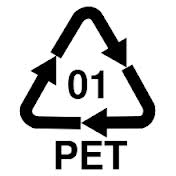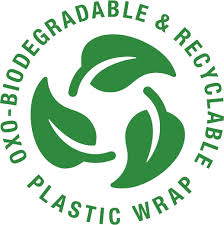I see two main aspects to the answer.
First, for a disposable object it's better to use a biodegradable plastic than one that is effectively permanent so that after the disposable object is used it doesn't stick around. That's true even if the biodegradable plastic is made from equally unsustainable materials. Our seas are already full of disposable plastic items, and this is a way to reduce the scale of that problem.
Secondly, there's the question of how the biodegradable plastics are made. Many are made from non-renewable materials, mostly oil, but there's a growing industry making them from renewable materials. Those are often called bioplastics in the industry. See for example http://www.biodegradableplastics.org/
Lastly, not all plastic substitutes are plastic. It's possible to buy many disposable items made from wood (often bamboo, like the ubiquitous plates and cutlery) or buy a non-disposable alternative (like a pottery coffee cup).
edit: "recycling" plastics often means down-cycling them significantly (eg food-grade plastic to a park bench), and recycling often means shipping them to China to be sorted and cleaned in horrible conditions. So (as usual) there's a hierarchy of best to worst for each use, and some uses can be substituted (the best disposable coffee cup is not as good as the best reused one, for example). And often the behaviour of the user is a key part of it (buying new "reusable" bags at the supermarket every time you shop defeats the point).
Even biodegradable items generally need something in order to biodegrade, whether that's sunlight, water, or some living thing to eat them. Generally rubbish is buried or incinerated, which means that biodegradable stuff quite likely will not get the chance to do that (methane emissions from landfills come from biodegradable stuff breaking down long after it's buried, for example). So unless your recycler collects and separates the biodegradable items and either sends them to someone who can recycle them (in which case them being biodegradable doesn't actually matter) or else composts them, they're likely to be considered non-recyclable and sent to landfill. I fear that composting counts as recycling to many people, but IMO it's an examplar of why "recycling" is the worst option in the three R's. In some ways it's a nice clean cycle: plants to bioplastic to useful thing to compost to more plants. Hooray! Unfortunately every step along that path probably involves consuming non-renewable resources (farms use oil, for example). It's much better to make something once and use it for as long as possible.
The three R's are the basis of this, and the main point is that recycling is the last, least favoured option. Reduce, reuse, then if you can't do anything else, recycle.

